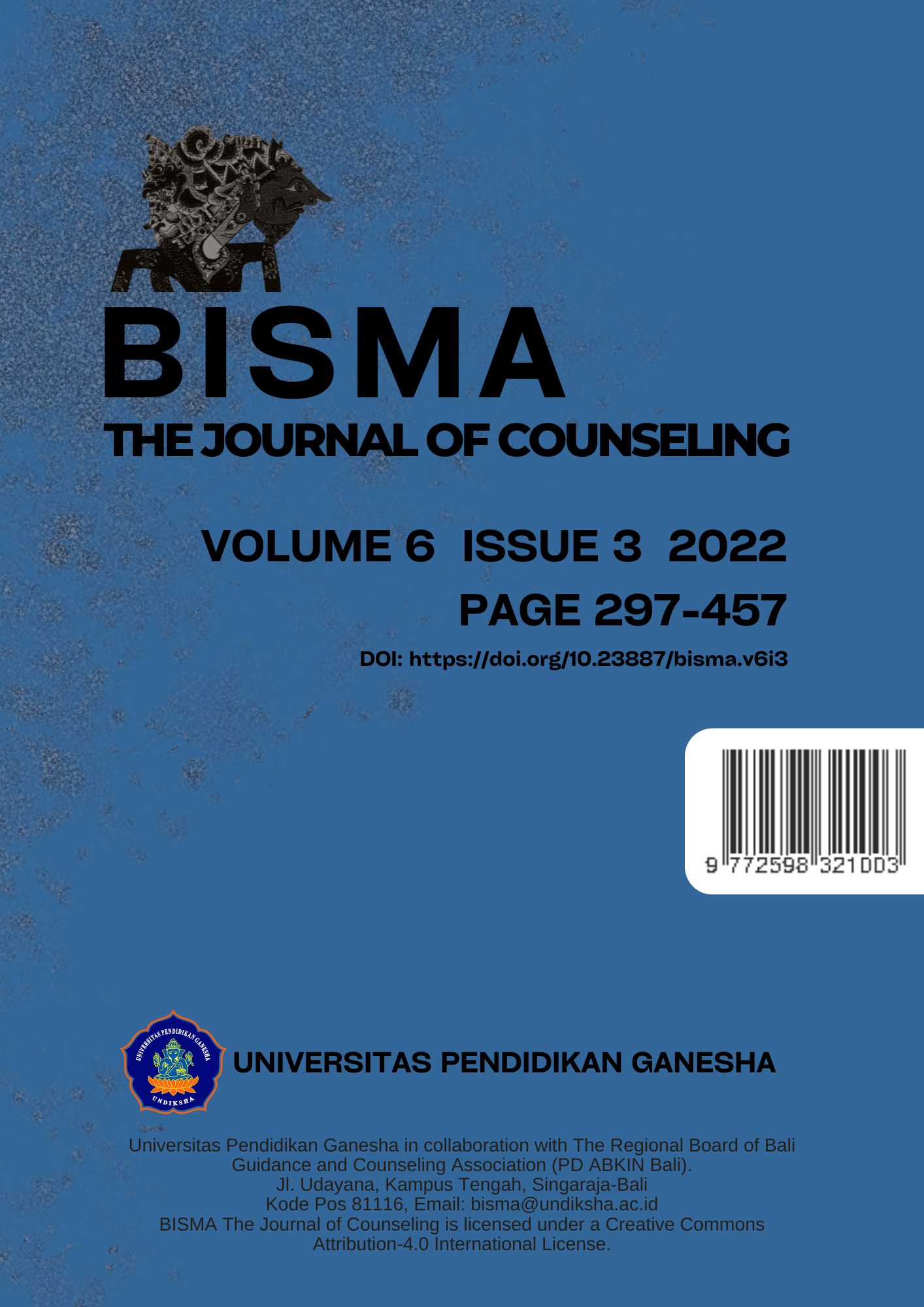The Contribution of Co-Worker Social Support on Burnout of School Counselor
DOI:
https://doi.org/10.23887/bisma.v6i3.53486Keywords:
co-worker, social support, burnout, school counselorAbstract
This study aims to examine the contribution of co-workers social support to the condition of school counselor burnout. This study uses a descriptive correlational quantitative method. The study population was a high school counselor SMAN in Pekanbaru . The sample amounted to 52 people who were determined by the Sampling total sampling technique. The instrument used was co-workers social support questionnaire and burnout with a Likert scale model . Instrument reliability test results co-worker social support 0.959 and burnout conditions of 0.976. The research data were analyzed using simple regression. The research findings show that there is a contribution of co-workers social support to the conditions of school counselor burnout by 37.4%. The implications of the results of the study can be used as an effort to improve the quality of guidance and counseling services, especially in increasing social support for work towards the conditions of school counselor burnout.
References
Adawiyah, R. A. R. (2013). Kecerdasan Emosional, Dukungan Sosial dan Kecenderungan Burnout. Pesona Jurnal Psikologi Indonesia, 2(2), 99-107.
Afdal, A. (2015). Kolaboratif: Kerangka kerja konselor masa depan. Jurnal Konseling dan Pendidikan, 3(2), 1-7.
Barak, M., Nissly., dan Levin. (2001). Antecedents to Retention and Turnover among Child Welfare, Social Work, and Other Human Service Employees: What can we learn from past research? a review and metanalysis. The Social Service Review, 75(4), 625-661.
Baron, R. A., dan Byrne, D. (2002). Psikologi Sosial Jilid 1. Terjemahan oleh Ratna Djuwita. Jakarta: Bumi Aksara.
Bataineh, O., dan Alsagheer, A. (2012). An Investigation of Social Support And Burnout among Special Education Teachers in the United Arab Emirates. University of Sharjah, 27(2), 5-13.
Blazer, C. (2010). “Teacher Burnout”. Information Capsule Research Services Office of Assesment, Research, and Data Analysis, 1003, 1-19.
Cherniss, C. (1980). Staff Burnout: Job stress in the human. London: Dage Publications.
Fernet, C., Guay, F., dan Austin, S. (2012). Predicting Intraindividual Changes in Teacher Burnout: The role of perceived school environment and motivational factors. Journal Teaching and Teacher Education, 28, 514-525.
Ganster, D. C., Fusilier, M. R., dan Mayes, B. T. (1986). Role of Social Support in The Experience of Stress at Work. Journal of Applied Psycholog, 71, 102-110.
Gold. Y., dan Roth, R. A. (1993). Teachers Managing Stress and Preventing Burnout:
The professional health solution. London: The Flamer Prees.
Kiarie, J. M., Sirera, A., dan Mwenje, M. (2011). The Effect of Burnout on Teacher Counselors Work Engagement. Kenyan Journal of Guidance, Counseling and Psychology, 1(1), 24-37.
Maslach, C., dan Leiter, M, P. (1997). The Truth About Burnout. San Francisco: Jossey Bas.
Purba, J., Yulianto, A., dan Widyanti, E. (2007). Pengaruh Dukungan Sosial terhadap Burnout pada Guru. Jurnal Psikologi, 5(1), 77-87.
Puspita, M. D. (2012). Hubungan antara Dukungan Sosial dan Makna Kerja sebagai Panggilan (Calling) dengan Keterikatan Kerja. Calyptra, 1(1), 1-17.
Sarafino, E. P., dan Smith, T. W. (2011). Health Psychology: Biopsychosocial interactions. Hoboken: Jhon Willey dan Sons, Inc.
Schonfeld, I. S., dan Bianchi, R. (2016). Burnout and Depression: Two enities are one?. Journal of Clinical Psychology. 72(1), 22-37.
Taylor, S. E., Peplau., dan L. A., Sears, D.O. (2009). Psikologi Sosial (edisi ke dua belas). Jakarta : Kencana Prenada Media Group.
Wiyono, Y. (2014). Peran Pemimpin, Rekan-Kerja, dan Keluarga dalam Memotivasi Karyawan di Pt Mulya Adhi Paramita Surabaya. Agora, 2(1), 368-378.
Wozny, K. W., Polowczyk, L. S., & Zygmunt, A. (2014). “Stress in the Teaching Profession”. Journal of Education, Health and Sport, 5(6), 191-2
Downloads
Published
Issue
Section
License
Copyright (c) 2022 Suci Habibah, Alfiah Alfiah, Herman Nirwana, Afdal Afdal, Raja Rahima, Hasgimianti Hasgimianti

This work is licensed under a Creative Commons Attribution 4.0 International License.









